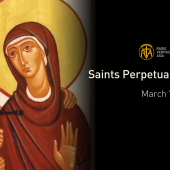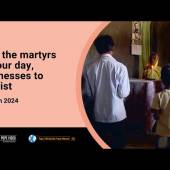St. Lawrence Ruiz and Companions, Martyrs

The feast of St. Lawrence Ruiz and Companions, Martyrs is being celebrated every September 28 of the year.
Lorenzo Ruiz is a Chinese Filipino who became the patron saint of the Philippines, the Filipinos, immigrants, the poor, separated families, and altar servers, according to Catholic Online.
He was beatified during Pope John Paul II's papal visit to the Philippines in 1981, which was the first beatification ceremony to be held outside the Vatican in history.
Lawrence was among the 16 Martyrs of Japan who were canonized by Pope John Paul II in the Vatican City on October 18, 1987.
Having lived an ordinary life in the Philippines, he became popular with his last words before he died in Japan from having been subjected to extreme cruelty by the Tokugawa Shogunate during its persecution of Japanese Christians in the 17th century:
“I am a Catholic and wholeheartedly do accept death for God. Had I many thousands of lives I would offer them all for him. Never shall I apostatize. You may kill me if that is what you want. To die for God—such is my will.”
Lawrence or Lorenzo was born in Binondo in Manila on November 28, 1594, where he also served as an altar boy at the local Dominican-run church. He was educated by the Dominican friars and was employed as a scrivener transcribing documents because of his skillful penmanship, according to Wikipedia.
He was involved in parish life, joined the Confraternity of the Most Holy Rosary, and lived a normal life. He married Rosario to whom he had two sons and a daughter.
According to Vatican News, they “lived the daily life of an unassuming Catholic family, content with their lot. No one would have guessed that the life of this man, who prayed, worked and raised his children just like so many other husbands and fathers, would take an entirely unexpected turn.”
Spanish colonizers ruled the Philippines during his lifetime. They brought missionaries and other benefits but they also ruled with injustices.
At age 36, while working as a clerk for the Binondo Church, Lawrence was falsely accused of killing a Spaniard. To avoid unjust punishment, he fled and sought protection on board a ship with three Dominican priests: Antonio Gonzalez, Guillermo Courtet, and Miguel de Aozaraza; a Japanese priest, Vicente Shiwozuka de la Cruz; and a lay leper Lázaro of Kyoto.
On June 10, 1636, they landed in Okinawa in Japan where Catholic persecution was intense. The Tokugawa Shogunate was persecuting Christians filling the land with martyrs and torturing others until they lost their minds. It feared that the Spanish invaded the Philippines through using religion.
The missionaries were arrested and interrogated but when they agreed to leave Japan, the shogunate further wanted them to denounce their faith. The belief was that if Christians publicly denounced their faith, other Japanese would see this as a sign of weakness and also abandon the faith.
They were imprisoned for two years and they were transferred to Nagasaki to face trial by torture. The group endured many and various cruel methods of torture, including being hung upside-down on a hill over a pit.
Father Shiwozuka, Lazaro and Lorenzo had a moment when they nearly renounced Christ because of terror but chose to hold on to faith.
Lawrence and his lay companion Lazaro died soon after, with the remaining three priests beheaded. They died on September 28 or 29, 1637. Lawrence was age 42 and died from eventual blood loss and suffocation. His body was cremated, with the ashes thrown into the sea.
The canonization of Lawrence was supported by a miracle in October 1983, when Cecilia Alegria Policarpio of Calinog, Iloilo, was cured of brain atrophy (hydrocephalus) at the age of two after her family and supporters prayed to Lorenzo for his intercession.
She was diagnosed with the condition shortly after birth and was treated at the University of the East Ramon Magsaysay Memorial Medical Center.
Radio Veritas Asia (RVA), a media platform of the Catholic Church, aims to share Christ. RVA started in 1969 as a continental Catholic radio station to serve Asian countries in their respective local language, thus earning the tag “the Voice of Asian Christianity.” Responding to the emerging context, RVA embraced media platforms to connect with the global Asian audience via its 21 language websites and various social media platforms.














